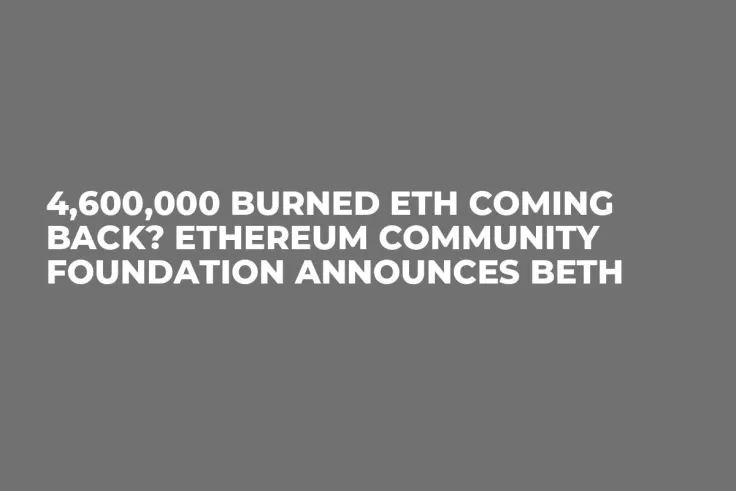
Disclaimer: The opinions expressed by our writers are their own and do not represent the views of U.Today. The financial and market information provided on U.Today is intended for informational purposes only. U.Today is not liable for any financial losses incurred while trading cryptocurrencies. Conduct your own research by contacting financial experts before making any investment decisions. We believe that all content is accurate as of the date of publication, but certain offers mentioned may no longer be available.
The Ethereum community is agitated by a startling announcement: The Ethereum Community Foundation, which is not the same as the official Ethereum Foundation, has announced the release of BETH, a new token that will be used to represent ETH that has already been burned.
Details on new token
As stated by the group, BETH is a proof-of-burn token, meaning that each unit represents an equivalent quantity of ETH that has been verified to have been taken out of circulation, in accordance with EIP-1559 and other burn mechanisms. Accordingly, the 40.6 million ETH that have been burned since the London upgrade could now be reissued as BETH.
The goal is to offer a new class of tokens that recognizes the destruction of supply, while simultaneously producing an open, auditable ledger of burned coins. Although specifics are still unknown, the announcement also alluded to the launch of related tokens BBETH and BBBETH. ETH burning will become a highly profitable activity, according to Joseph Lubin, co-founder of Ethereum and CEO of ConsenSys, and BETH is a crucial step in formalizing that process.
Why it's questionable
Although the idea has created excitement, there are also important concerns. The very idea behind burning coins, to permanently reduce supply, is undermined when they are tokenized. The narrative of ETH scarcity may wane if the community starts to view BETH as a complementary asset with speculative potential.
Furthermore, BETH’s value does not increase simply because it is associated with burned ETH. BETH is not inherently involved in Ethereum’s consensus staking or gas fee structure in contrast to ETH itself. It’s basically a derivative product with unknown long-term utility.
Ethereum Community Foundation is not the Ethereum Foundation, as stated in the announcement. Because it could affect BETH’s acceptance and legitimacy, this distinction is crucial. Without well-defined governance, practicality and consumer demand, BETH runs the risk of becoming more of an oddity than a game-changing invention.
Although tokenizing burned assets can bring transparency, it also raises paradoxes: Does representing destroyed value add value or simply lessen the act of burning itself? Until these issues are resolved, BETH should be used cautiously.


 Dan Burgin
Dan Burgin Vladislav Sopov
Vladislav Sopov